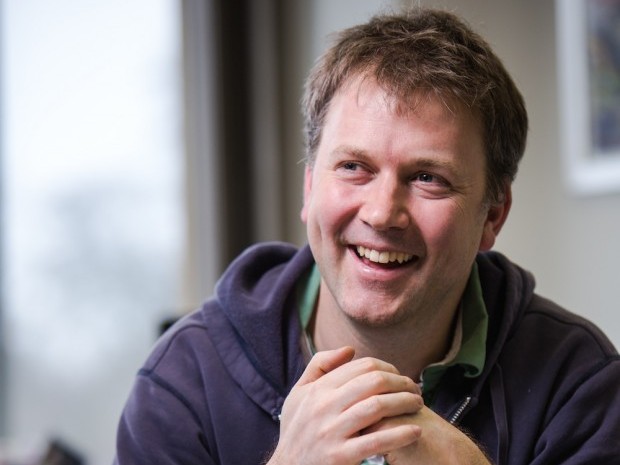
On target
The Centre for Therapeutic Target Validation (CTTV), a new public-private initiative for biomedical science on the Genome Campus, is now up and running. Using data from genome-scale experiments, the centre’s scientists are working to find which molecules are the most promising targets for medical intervention.

The CTTV offices in the EBI’s new South Building are home to disease biologists from GlaxoSmithKline (GSK), data integration and analysis experts from EMBL-EBI and genomics experts from the Wellcome Trust Sanger Institute. Ewan Birney, Interim Head of the CTTV, answers a few questions about the new initiative.
What is target validation? Is it about designing new drugs?
Target validation is about understanding which gene products, if you change them, would change the course of a disease. That is not the same as finding which gene products are involved in a disease. A protein might be involved in a disease, but that doesn’t necessarily mean that changing it will make a person better or worse. So we want to know, if I change this protein, would it change somebody who has a disease – would it make them better? That knowledge would be incredibly useful for lots of different people, particularly those working in pharmaceutical companies like GSK.
Don’t pharmaceutical companies work on target validation already?
Pharmaceutical companies are very good at finding or designing the molecule that can change the activity of a protein, but it’s much harder to figure out which proteins are the right ones to target. GSK knows all too well that this is too big a puzzle to solve inside of one company, so they have brought their expertise alongside that of the EBI and Sanger Trust so we can make some real progress in this area. The reason it’s so important is that drugs take many years to develop, and that costs a lot in terms of research effort and resources. At the moment, companies are often choosing the wrong target at the beginning of the process, and researchers are losing valuable time and have to start all over again. We want to help turn that around.
Why is this project happening now?
Because the technology has matured. We have accumulated enough knowledge of how the human body works on the molecular level that we can design sensible ways of working on target validation. Data generation is now cheap enough that we can carry out our experiments using information from a large number of people, and we need to do that to understand whether our statistics are really solid. We also have the critical mass of bioinformatics expertise you need to make something like this work, both for managing and storing the huge amount of data that will be generated, and the tools you need to statistically analyse all that data. What the EBI is bringing to this collaboration is true depth in both of those areas.
What’s been happening in the CTTV’s first month of operation?
The biggest thing that’s happened is that our scientific programme has been given the stamp of approval by all the institutes involved. Most of the activity now is about getting the right people in place to start working on the projects. Once we start generating interesting data, we will be sure to let everyone know about it.
What do you find most interesting about the CTTV?
This is a transformative collaboration that’s tackling a problem that really affects healthcare. The CTTV is putting together expertise in basic research from the EBI and Sanger Trust with GSK’s very different approach to R&D. What I’m particularly excited about is that it’s being done in a pre-competitive way. All the data we generate and the systems that we make will be open to everyone. This means that the benefit goes beyond GSK to everyone who benefits from faster and more efficient drug discovery, including other researchers and, most of all, the people who have a real need for new and effective therapies.


